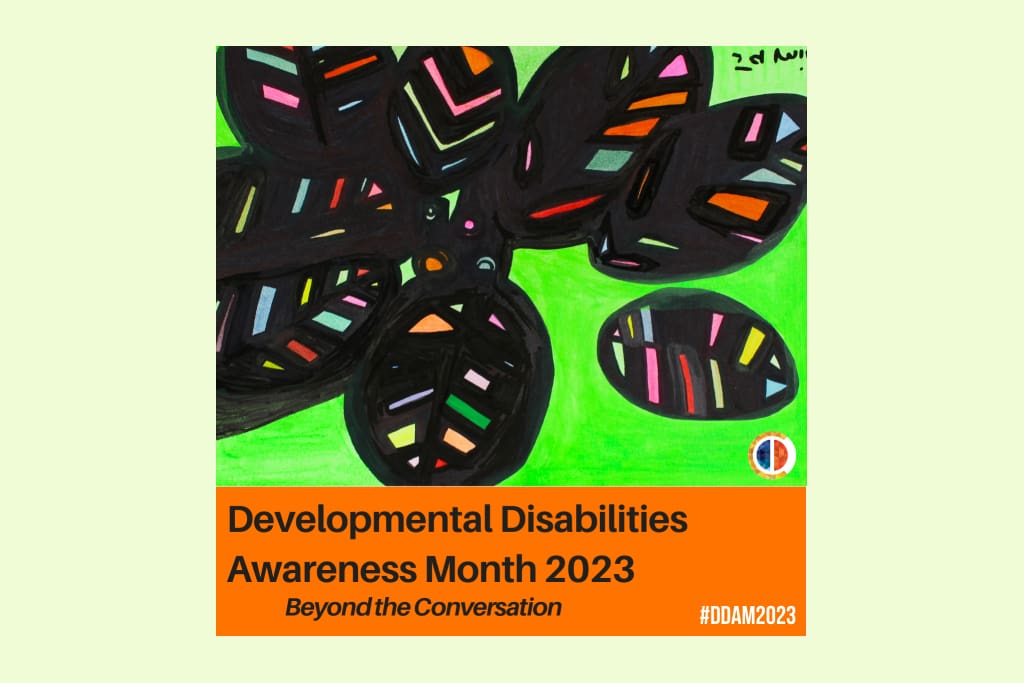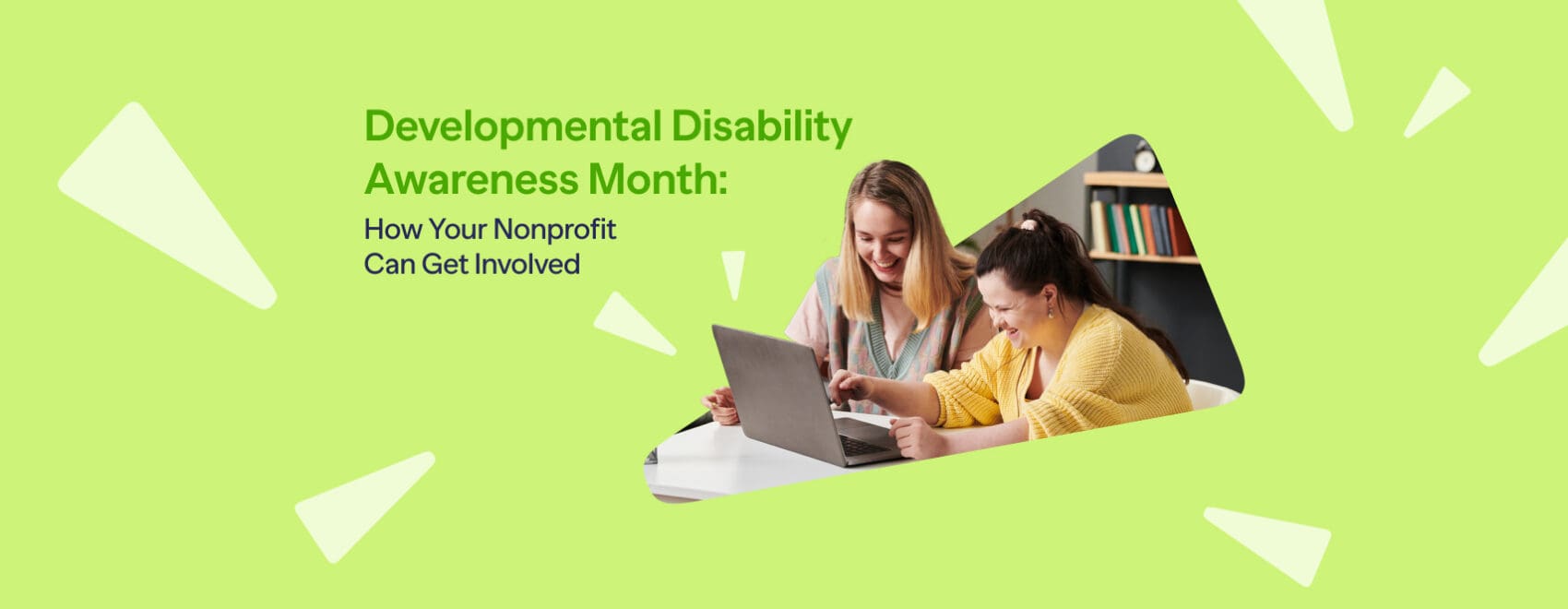March is Developmental Disabilities Awareness Month and it’s a great opportunity to raise awareness for this important cause as well as your own.
First things first: what is Developmental Disabilities Month? Created by President Ronald Regan in 1987, the month gives Americans a chance to support, celebrate, and empower individuals with developmental disabilities.
Developmental disabilities (DD) affect many people. The CDC shows that 1 in 6 children between the ages of 3 and 17 in the United States have at least one developmental disability. It might involve challenges with learning, such as attention-deficit/hyperactivity disorder and autism. Or the challenges may relate to intellectual and physical functioning, such as Down syndrome and cerebral palsy.
Whether your organization works with folks with DD or not, this March you can be an advocate for welcoming people with disabilities into the community. Research shows that most Diversity, Equity, and Inclusion initiatives sideline disability training and education. If your organization takes equity and inclusion seriously, March offers the perfect time to re-examine your commitment to embracing folks with DD.
We share four thoughtful ways your team can get involved with making a positive change for folks with disabilities, all while increasing awareness of your nonprofit and boosting revenue.
Communicate change

Make it clear that everyone, including people with disabilities, has a valued place in your organization, whether as staff, volunteers, or supporters. Be deliberate about it. Ensure your nonprofit’s mission and values are deeply aligned with disability inclusion.
Once you have a clear vision of what you stand for, why not leverage Developmental Disabilities Awareness month and pen an op-ed in your local newspaper? Or write a reflective post for your social media channel? You can even go all in and issue a formal press release. Your nonprofit gets to restate its values, include more people, and get some well-earned exposure.
Here are the top tips to keep in mind when talking publicly about disabilities:
Cultivate connections
There are some ground-breaking initiatives and disability resources for anyone who’s looking to get involved. For example, Pledge to Include is a grassroots movement that aims to challenge misinformation and discrimination facing people with DD.
When you post to your social media channels, for example, use the movement’s hashtag #pledgetoinclude to show that you have taken a pledge to be an inclusive organization. Their Instagram account also has links to tons of helpful resources, like social media templates, lists of disability justice influencers to follow, and informational videos.
Watch your language
When talking about people with disabilities, whether in your organization or community, make sure you use “people first” language.
It might sound obvious, but it’s critical to focus on everyone’s strengths and talents as human beings, not as disabled folks, or you risk alienating a proportion of your constituency. It’s “John, the volunteer and donor” not “John, the deaf person.”
That said, some view their disability as an important component of their identity. In that case, it might be “John, the deaf volunteer and donor.” Just like with gender pronouns, it’s not hard to simply ask how people want to be referred to. For more specifics, refer to the Disability Language Style Guide.
Don’t be patronizing
Don’t dance around the subject of someone’s disability with phrases like “special” or “intellectually challenged.” You might think you’re being delicate or considerate, but really, most people with DD see it as patronizing, and they don’t typically use such terms themselves.
A disability is just that: a disability. There’s nothing “abnormal” about it, and people don’t “suffer from” a disability. Also, having a disability doesn’t automatically make someone “an inspiration to us all.”
It’s also important to keep in mind that the Americans with Disabilities Act protects people with disabilities, not people with “special needs,” which is a vague term.
Recruit for change
How’s your recruiting process? Fewer than 1 in 4 organizations in the social sector make a strategic effort to recruit people with disabilities. This is a mistake. Why? Because research shows that companies that recruit and hire employees with disabilities are more profitable.
In addition to losing out on profitability, inadvertently discouraging folks with disabilities from applying to and volunteering in your organization means you’re missing out on a very deep talent pool. Not to mention, you risk alienating a group of potential donors! Being more inclusive isn’t just the right thing to do, it’s also awesome for the overall success of your nonprofit.
Convinced? We thought so.
Use the month’s special momentum to take a cue from Microsoft: when they realized that their hiring process was causing them to overlook people with autism, their leadership team worked with an autism-support group to revamp their interview process. Results? A recruiting strategy that doesn’t sideline potential star players.
To get started, explore groups like the Job Accommodation Network—their site has tons of useful resources for reaching out to folks with DD.

Find concrete solutions to boost positive change
Even if you have the best intentions, it’s not enough to just talk the talk.
There are many accommodations and tools available to your nonprofit that empower folks with disabilities, which cost very little or nothing to implement.
Facility upgrade
Update your facilities and work processes to encourage flexibility and accessibility. From sidewalk ramps to making captioning available on all video presentations, you can take concrete steps to make sure that all your team members and supporters have the chance to do their best.
Relationships upgrade
When choosing which vendors, businesses, and organizations to partner and collaborate with, check their inclusion strategies.
Would you want to work with a team that never hired women, for example, or Asian-Americans? We didn’t think so. Participate in and promote partnerships that align with values of inclusion. For inspiration, check out the CDC’s top inclusion strategies for reaching out to folks with disabilities and start seeing positive change ASAP.
Event upgrade
So, you have a big fundraising event coming up. Great! If you’re dedicated to including people with disabilities, take steps to make sure it happens.
- Be open to accommodation requests. Whether on your event program, website, or fundraising page, give people the option to reach out with questions and requests for accommodations. Maybe some of your supporters will ask for speakers to always face the audience so that they can lip read, or for a buffet table that permits one-handed use.
- Make all registration, ticketing, and programs fully accessible, including everything from a physical site that’s welcoming for folks with mobility issues to vegetarian snack options (nutritious food is super on-trend, anyway!).
- Diversify your materials. While going paperless is a noble goal, for some events, your audience will benefit from handouts with large fonts. 16-point minimum Sans Serif font with high contrast colors is a good benchmark.
- Remember that not all disabilities are apparent. Be sensitive when planning your event, because you never know which of your donors or volunteers might be dealing with an “invisible” disability like chronic pain, diabetes, anxiety, or epilepsy.
Educate for Change
While your staff members and supporters are surely on board with being respectful to people with DD, they might not know how to go about it! Some of your staff members might be concerned that they’ll do or say the “wrong” thing, causing unintended offense.
What’s the best way to overcome those fears? By increasing awareness and education about how to recruit, train, work with, manage, and interact with folks with disabilities, both in your nonprofit and the wider community. Aside from empowering all your employees, potential employees, and donors, disabilities awareness training can help your organization reach more supporters.
- Training. Host training webinars and seminars on disability etiquette for your staff, recruiters, and volunteers. The Job Accommodation Network has an excellent list of groups and products that can help your nonprofit become more aware of developmental disabilities and how they affect your organization.
- Awareness. Encourage your network of employees and donors to share, in a supportive environment, how disabilities have affected them. Maybe they have a friend, parent, or child who has a developmental disability. Maybe they’re the ones with a disability. It will quickly become very clear just how much developmental disabilities affect us all, helping to overcome discomfort and stigma.
- Consultation. Reach out to a trained expert to help your nonprofit become more inclusive. Teachers, social workers, and therapists are available for consultation. They can help you draft materials, upgrade your tech and facilities, and prepare programs for events that encourage people with disabilities to participate in your organization and support your cause.

Inclusivity Brings You One Big Step Closer to Your Goals
You’re helping others who are impacted by developmental disabilities. Also, the more diverse your constituency, the more donors and supporters your message will reach. It’s an easy win.
